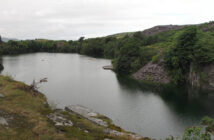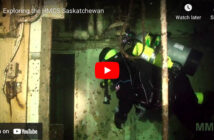A Virgin StartUp-backed company, ARC Marine, is creating an artificial reef at premier UK diving site Vobster Quay in 2017. They aim to protect the globally endangered white-clawed crayfish, which is threatened with extinction in the next twenty to thirty years.
ARC Marine was founded in 2015 by two Health and Safety Executive qualified commercial divers, Tom Birbeck and James Doddrell, who design and create artificial reefs that provide marine habitats for vulnerable species. They are creating an artificial reef at Vobster Quay and are collaborating with Bristol Zoo to protect the white-clawed crayfish from extinction. Vobster Quay is one of the registered Arc sites that hosts a regeneration program for this species of crayfish.
The white-clawed crayfish is threatened with extinction due to habitat destruction and the introduction of an aggressive, invasive US breed; the signal crayfish. White-clawed crayfish are also sensitive to many pollutants, such as insecticides, which run off sprayed land and into watercourses during rainfall events. The reef modules used to protect this declining species should last five hundred years and juvenile crayfish will be deployed onto them at Vobster Quay. The marine-friendly concrete mix has already been tested in British waters for its suitability.
Dr Nicholas Higgs, the Deputy Director of the Marine Institute at the University of Plymouth, tests structures built for the marine environment. He stated the ARC modules concentrate fish and nutrients around the reef and so provide a whole ecosystem. Higgs commented:
“The ARC modules provide increased habitat complexity. By providing that living space, you should be able to increase the amount of crayfish that can live in habits like quarries and man-made water bodies.”
Overfishing is a known problem in the UK and overseas, with fifty-three per cent of the world’s fisheries fully exploited. A further thirty-two per cent are over-exploited, depleted or recovering from depletion, according to the World Wide Fund for Nature (WWF). At the current rate of exploitation, all species fished for food are predicted to collapse by 2048. Birbeck is confident ARC Marine can be a UK leader in reversing this trend with their own conservation efforts and by using crowdfunding to encourage community involvement:
“Oceans and waterways belong to everyone. So, the responsibility of marine conservation, and the challenge of reversing ocean degradation, is one that we all must collectively tackle.”
“We’re giving the crowd the power to rebuild and protect our delicate marine environment for generations to come with a 500+ year project lifespan. There is no pledge like it in the history of crowdfunding.”
Depending on the size of donation to their campaign, contributors can have their own reef module built, become an ARC Marine Ambassador or gain free entry to Vobster Quay to dive the lake and learn about crayfish conservation.
The campaign will also fund Birbeck and Doddrell’s research into creating a substantial artificial reef in Torquay, Devon. Their primary aim is to produce products that will assist the rehabilitation of seabeds and will last longer than ships, which are often used to create artificial reefs. Their modules prevent fishing, by interrupting trawling and towing efforts, and boost stocks of fishery species. They act as robust anchor points for cages and buoys and are also used in coastal and offshore areas to protect from erosion. They aim to complete their first significant reef in 2017.








